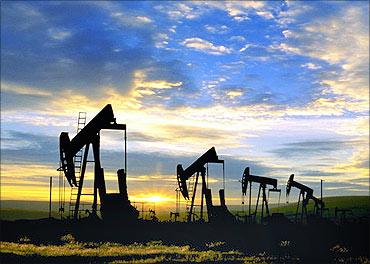The situation in the global markets is such that countries with abundant resources are faring worse in terms of development than those with less, says A V Rajwade.
 Last week, while addressing the India Investment Summit in New Delhi, Finance Minister Arun Jaitley assured foreign investors, including representatives of sovereign wealth funds, that India has "opened the gates for (foreign) investment" (The Economic Times, February 5).
Last week, while addressing the India Investment Summit in New Delhi, Finance Minister Arun Jaitley assured foreign investors, including representatives of sovereign wealth funds, that India has "opened the gates for (foreign) investment" (The Economic Times, February 5).
On another page in the same newspaper, there was a report on how global fund managers, hurt by sovereign wealth funds from oil exporting countries in need of cash, were redeeming their investments.
Have we opened the gates at the wrong time?
What we are seeing in the global markets is a classic example of the "resource curse" or the "Dutch disease": the paradox that countries and regions with an abundance of natural resources, minerals and fuels, for example, tend to have worse development outcomes than countries with fewer natural resources.
The latter expression comes from the experience of the Netherlands half a century ago, when abundant natural gas output brought in foreign revenue but reduced the domestic economy's competitiveness on account of a rising exchange rate.
The symptom of the "Dutch disease" is the inability of the domestic economy to compete globally, thanks to a bloated exchange rate.
Contrarily, there are enough examples in the post-war economic history of economies not blessed (or cursed?) with natural resources having developed much faster - from Japan to Korea to Taiwan to China to India, all of which import most natural resources from oil to copper to… which they need.
The reason why resource-rich economies are currently suffering is of course the sharp fall in commodity prices, particularly oil, over the last year or so: the result of a fall in demand even as supplies, particularly of crude oil, have gone up through technological progress. (The US has moved, in a few short years, from being the world's largest importer of oil, to the largest oil producer in 2014, replacing Saudi Arabia!)
While it is true that at today's prices many oil producing companies are becoming "sick", this is unlikely to make a significant difference to the oil price.
The aggregate debt of the oil sector is estimated to be $2.5 trillion - and "vulture funds", which specialise in buying distressed debt, are salivating.
Looking at the broader energy sector, the technological revolution in solar energy, electric cars etc is likely to keep the demand for oil subdued, particularly when China and, indeed, the global economy is slowing.
Saudi Arabia is a good example of the resource curse. The International Monetary Fund (IMF) recently estimated that it will run out of its reserves of foreign exchange in five years.
As Roula Khalaf wrote in the Financial Times on January 2, 2016, "A lavish welfare state that breeds indolence and apathy must one day come to an end": It has already been forced to tighten its budget, and raise energy prices in the domestic market significantly.
It is finding out that "rentier income" is not a very reliable way to finance expenditure. The Saudis are likely to access the global bond market with a major issue later this year.
If even the Saudis are facing major problems, the plight of other producers such as Russia, Iraq, the UAE, Venezuela as well as oil exporters in Central Asia and Africa - Nigeria, in particular - can well be imagined.
All are likely to experience a sharp fall in gross domestic product in the current year. (One major oil exporter whose economy would improve in the current year is of course Iran, thanks to the lifting of sanctions by the US after a long time.) The World Bank and the IMF should be getting many new clients shortly.
It is not only oil exporters who are suffering; economies which depended on commodity exports in general are also in the same boat.
If one looks at the BRICs, Russia is a major exporter of oil and gas, while Brazil and South Africa are commodity exporters. All three economies are in recession.
One wonders whether "TICK" - Taiwan, India, China and Korea - would replace BRICS as the new grouping of fast-growing emerging economies.
Are there any lessons for us in India from the plight of the oil exporters?
We have of course got a huge benefit to our balance of payments through lower imports - but the trade deficit has not fallen, thanks to a sharp fall in exports.
In some ways, are inward remittances and portfolio capital inflows our "Dutch diseases", leading to an overvalued exchange rate?
The author is chairman, A V Rajwade & Co Pvt Ltd.











 © 2025
© 2025